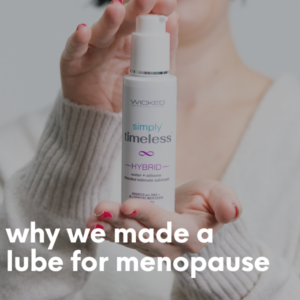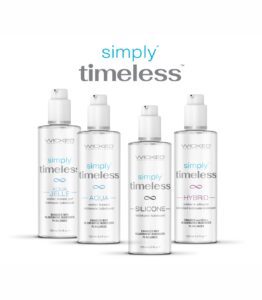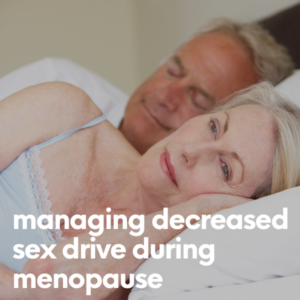Safe Sex and Menopause: When to Stop Worrying About Pregnancy
 Menopause brings significant changes to the reproductive system, so it’s not surprising that one question many people have is: “When can I safely stop using birth control?” If you’re navigating perimenopause, menopause, or are postmenopausal, understanding how long to use contraception is crucial to prevent unintended pregnancy and maintain safe sexual practices. Keep reading for clear guidelines on when you can safely stop using birth control, explore the best contraceptive options during this stage of life, and discuss how to keep your sexual health in check during menopause. The following is not intended to be medical advice—always talk to your doctor before changing any birth control routines.
Menopause brings significant changes to the reproductive system, so it’s not surprising that one question many people have is: “When can I safely stop using birth control?” If you’re navigating perimenopause, menopause, or are postmenopausal, understanding how long to use contraception is crucial to prevent unintended pregnancy and maintain safe sexual practices. Keep reading for clear guidelines on when you can safely stop using birth control, explore the best contraceptive options during this stage of life, and discuss how to keep your sexual health in check during menopause. The following is not intended to be medical advice—always talk to your doctor before changing any birth control routines.
Understanding Menopause and Fertility
Menopause is defined as 12 consecutive months without a menstrual period. Once you reach this milestone, your ovaries have stopped releasing eggs, and pregnancy is no longer possible. However, during the perimenopausal stage—the transition leading up to menopause—your body is still producing eggs, though less consistently. This means that even if your periods become irregular, you can still ovulate and potentially become pregnant.
When is it Safe to Stop Using Birth Control?
You can safely stop using birth control when you have gone a full year without a menstrual period. However, perimenopause can last several years, and during this time, your fertility decreases but does not disappear entirely. According to the North American Menopause Society (NAMS), many people mistakenly believe they are no longer fertile once their periods become irregular. The reality is that until you have officially reached menopause (12 months without a period), you should continue using birth control to avoid an unplanned pregnancy.
Why Perimenopause is Tricky
During perimenopause, your hormone levels fluctuate, leading to unpredictable menstrual cycles and ovulation patterns. You may skip periods for a few months, only to have them return unexpectedly. This makes natural family planning methods, such as tracking ovulation, unreliable during this stage. As NHS Inform advises, relying on the rhythm method or other natural birth control strategies is not recommended during perimenopause because of these irregularities.
Safe Contraceptive Options for Perimenopausal People
Choosing the right contraceptive method during perimenopause is essential for both preventing pregnancy and supporting your overall health. Here are some of the most effective and appropriate options for people in midlife:
1. Hormonal Contraceptives
Hormonal contraceptives, such as birth control pills, skin patches, vaginal rings, and injections, remain popular choices during perimenopause. They not only prevent pregnancy but can also offer additional benefits like reducing menstrual bleeding, easing hot flashes, and maintaining bone strength. However, it’s important to note that hormonal contraceptives are not suitable for everyone. People who smoke or have a history of heart disease, high blood pressure, or blood clots should avoid estrogen-containing contraceptives due to the increased risk of serious side effects.
2. Intrauterine Devices (IUDs)
IUDs, both hormonal and non-hormonal, are long-lasting, low-maintenance options that can be ideal for perimenopausal people. Hormonal IUDs can help reduce heavy periods and are effective for up to five years, while copper IUDs provide hormone-free contraception for up to 10 years.
3. Barrier Methods
Barrier methods, including condoms, diaphragms, and sponges, are another safe option. Condoms also offer the added benefit of protecting against sexually transmitted infections (STIs), which is especially important as vaginal dryness and thinning of the vaginal walls during menopause can make you more vulnerable to infections.
4. Sterilization
For people who are certain they do not want more children, sterilization (tubal ligation) is a permanent solution. A vasectomy for a male partner is another option that offers permanent contraception.
Why You Should Keep Using Condoms
Even if pregnancy is no longer a concern, condoms should remain part of your sexual health routine. As you age, hormonal changes can lead to vaginal dryness and thinning vaginal walls, making it easier for infections to take hold. NHS Inform emphasizes that condoms are the only contraceptive method that also protects against HIV and other STIs.
Special Considerations for Hormonal Contraceptives
Hormonal contraceptives offer several benefits for perimenopausal people beyond preventing pregnancy. According to NAMS, these benefits can include:
- More regular menstrual cycles
- Reduced menstrual bleeding and lower rates of anemia
- Decreased uterine pain during menstruation
- Reduced risk of ovarian and uterine cancer
- Maintenance of bone density
- Improvement in acne, which can sometimes flare up during menopause
However, these contraceptives can also mask the signs of menopause, making it difficult to know when you’ve officially transitioned. Some healthcare providers recommend stopping hormonal birth control around age 51 (the average age of menopause) to see if menopause has occurred, but this strategy is not always reliable. If you are still experiencing withdrawal bleeding (similar to a period) due to your birth control, it’s likely masking the signs of menopause.
When Should You Consult Your Doctor?
If you’re unsure when to stop using birth control or need help choosing the right method during perimenopause, it’s best to consult with your healthcare provider. They can guide you based on your health history, lifestyle, and preferences. Regular check-ins with your provider can also help monitor any risks associated with hormonal contraceptives, especially as you approach menopause.
 The Importance of Safe Sex After Menopause
The Importance of Safe Sex After Menopause
Once you’ve reached menopause and are no longer concerned about pregnancy, it’s easy to overlook the importance of safe sex. However, continuing to protect yourself against STIs is essential. As mentioned earlier, vaginal atrophy (thinning and drying of the vaginal tissues) can increase the risk of infections, making barrier protection more important than ever.
If you experience vaginal dryness or discomfort during sex, lubricants and vaginal moisturizers can be helpful. Additionally, your doctor may recommend vaginal estrogen treatments to restore moisture and elasticity to the vaginal tissues.
simply® timeless Lube for Menopause
The simply® timeless collection from Wicked Sensual Care is specially formulated for those experiencing perimenopause, menopause, and beyond, addressing the unique needs that arise during these stages of life. This collection offers four thoughtfully crafted lubricants, each designed to support comfort, pleasure, and sexual wellness as your body changes.
 1. simply® timeless Aqua
1. simply® timeless Aqua
This water-based lubricant is gentle and hydrating, ideal for those with sensitive skin. It provides long-lasting moisture without any sticky residue, making it perfect for easing discomfort from dryness often associated with menopause.
2. simply® timeless Aqua Jelle
Designed for those who need a thicker consistency, simply® Aqua Jelle provides enhanced cushioning and comfort. This formula offers a luxurious, long-lasting glide, making it ideal for both intimate moments and daily vaginal moisture.
3. simply® timeless Hybrid
A blend of water and silicone, simply® Hybrid combines the easy cleanup of water-based lubes with the lasting power of silicone. This formula is perfect for those who need a bit more longevity without compromising on smoothness, ensuring comfort during intimate activities.
4. simply® timeless Silicone
For those requiring the longest-lasting formula, simply® Silicone offers extra comfort with its rich, velvety texture. It’s designed to provide reliable moisture and glide for those who need more protection against discomfort.
The simply® timeless collection is crafted to help you embrace every stage of your journey, supporting comfort and intimacy with gentle, effective formulas tailored to your needs.
Safe Sex and Menopause
Navigating birth control during perimenopause and menopause can be tricky, but understanding your options and knowing when it’s safe to stop using contraception can help you make informed decisions. Remember that until you’ve gone a full year without a period, pregnancy is still possible. Continue using effective birth control if you want to avoid an unexpected pregnancy during this time.
Whether you’re considering hormonal contraceptives, IUDs, or barrier methods, prioritize both your reproductive health and overall well-being. And don’t forget—safe sex practices are crucial at every stage of life. Protect yourself, communicate with your partner, and seek professional advice if you’re unsure about your contraceptive needs.
For more resources on menopause and safe sex practices, visit the North American Menopause Society or talk to your healthcare provider.
Share with your friends:
Subscribe to the Wicked Sensual Community Newsletter!


